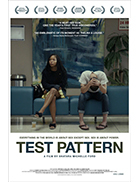Test Pattern
|  Shatara Michelle Ford’s debut feature Test Pattern is a harrowing account of the aftermath of a sexual assault. Ford, who both wrote and directed, shifts between present and past to punctuate the emotional and relational impact of the assault and to highlight how such an event forever alters our perception, even of those we love. She brings out seemingly benign events from the past that take on new, and sometimes disturbing, significance. Also, because Ford opens with the assault (or at least the immediate moments leading up to it, leaving no doubt as to what happens), it frames every event we see afterwards, causing us to both cringe as we watch the incident slowly develop and reflect on what happened before and how certain ingrained patterns of gendered thinking are so prevalent that we hardly even notice them. The first 20 minutes of the film following the oblique opening reference to the assault focus on the initial stages of the relationship between the film’s protagonists: Renesha (Brittany S. Hall), a black corporate development officer, and Evan (Will Brill), a white tattoo artist, in Austin, Texas. In many ways they seem like opposites—his casual slacker vibe contrasts with her well-put-together midtown style—but they click, and Hall and Brill have a believable screen chemistry that trades heavily on the inherent awkwardness and excitement of a new relationship. He is, by all that we see, a “nice guy” who respects her as a woman and as someone with a career. When we jump forward several months to the point that they are living together, she is getting ready to head off to a new job and he is wearing an apron and cooking her breakfast. Little to nothing is made of this arrangement, just as little or nothing is made of their being an interracial couple; but, those dynamics, however unadorned, are still important and come into play in subtle ways later on. The center of the film is held by the night when Renesha is sexually assaulted after she and her friend Amber (Gail Bean) go out for drinks on a Monday night. Their girls’ night is interrupted by a pair of young e-commerce entrepreneurs (Drew Fuller and Ben Levin) who claim to be out celebrating the sale of their company. Renesha, who promised Evan she would be home be midnight, is reluctant to engage, but Amber, who is single, wants to hang out and is clearly attracted to one of them, which sticks Renesha in the reluctant support role. More and more drinks ensue, followed by some pot gummies, and soon the world is starting to blur and slow down. Ford and cinematographer Ludovica Isidori prove to be masterful manipulators of visual space and focus to externalize Renesha’s disorientation. Whether she is just really drunk or has been slipped something in one of her drinks is never made explicitly clear, but what is not in question is that one of the guys takes advantage of her inebriated state to rape her in a hotel room, an event that he treats like a casual one-night stand that requires no discussion or even really acknowledgement. The second half of the film is something distinctly different, played as an almost Kafkaesque critique of the health care system. Evan, determined that Renesha needs to have a rape kit administered, takes her from hospital to hospital, each of which sends them somewhere else because they are not equipped to do the forensic exam. It demonstrates how, even in the #metoo era, the basic necessities of ensuring at least a chance at justice for women who are sexually assaulted are not to be expected. The familiar frustrations of the medical care game—waiting for long periods, sitting in rooms for hours, dealing with various hospital workers who are either falsely chipper or banal in their responsiveness—play out as would expect, although Ford does not always depict them as you might expect, at one point giving us a slow motion sequence of filling out forms set to Tchaikovsky’s “Waltz of the Flowers.” However, what is most interesting about this part of the film is not its critique of the health care system, but rather the rapidly shifting dynamic between Renesha and Evan, the latter of whom at first appears to be exceptionally understanding and reassuring of her situation (he doesn’t get angry with her or blame her or demand an explanation). Yet, as the day stretches on and the frustrations with the repetitions and bureaucratic roadblocks mount, his determination to obtain a rape kit begins to feel less and less like his wanting to help Renesha and more like his need to assert himself as a man in the situation and Do Something. Is it about helping his traumatized girlfriend achieve justice or assuaging his own masculine insecurities, especially the ones he cannot bring himself to voice? His single-minded focus on the rape kit functionally blinds him to her experience, so that even when she starts begging him to just take her home, he refuses. This deeply problematic response, which builds and builds as the film goes on, is underscored by several flashbacks to early moments in their relationship, including one in which he shows up late to a party with his friends and seems to not understand how she would feel uncomfortable being there alone, and, more disturbingly, a seemingly innocuous moment of intimacy when he tells her that he wants to choose a new tattoo to brand her with “because you’re mine.” It is said in a way that seems flirty and playful, but the words land with a sickening thud in light of his actions after the assault, in which her needs, emotional and otherwise, mean nothing in the face of his need to somehow fix it. It is a deeply painful series of events to witness, as we see Renesha drawing deeper and deeper into herself in the moment when she most needs support while Evan’s seeming indifference to traditional gender roles crack under pressure and reveal some very old and troubling inclinations. It is important to note that Ford does not make Evan out to be a villain; Test Pattern is not interested in simplistic male bashing, but rather wants to delve into the ways in which longstanding patterns of social behavior and thought are so deeply embedded in our unconscious that they can emerge in even the most seemingly benign and progressive soul. Nice guys may be nice, but they aren’t perfect, and the film’s ambiguous final moments invite us to wonder whether Renesha and Evan will ever be able to pull together again and repair the damage or whether her victimization and his misguided response to it will forever drive a wedge between them. Copyright © 2021 James Kendrick Thoughts? E-mail James Kendrick All images copyright © Kino Lorber |
Overall Rating: 


 (3.5)
(3.5)


